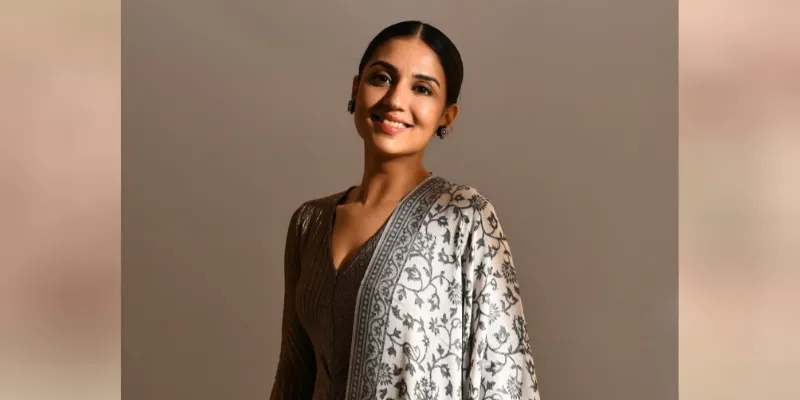This self-taught fashion designer’s handwoven Kashmiri shawls are a favourite with Shilpa Shetty, Dia Mirza, and Karisma Kapoor
Working with 50 kashmiri weavers, former Zoom and NDTV employee Sugandha Kedia is on a mission to accurately represent Kashmiri shawls through her latest venture Dusala Kashmir.
After years of working as a television journalist in Delhi for six years, Sugandha Kedia found herself at sea after she got married and moved to Raipur, Chattisgarh.
She says, “After hustling for a number of years, I thought of taking a sabbatical. It didn’t happen as planned, and so I went ahead and launched a multi- designer store, One in 2017 that featured several well-known brands like Sabyasachi, RANI-SVA, Anju Modi, Saaksha & Kinni, Deme by Gabriella, Anavila, and Limerick.

Sugandha Kedia, Founder of Dusala Kashmir
In the same year, the former Zoom and NDTV employee started posting online content about make-up and fashion on Instagram. With increased engagement since the lockdown, it is also helping steer the marketing efforts of her most recent passion project, Dusala Kashmir, a handcrafted brand featuring shawls, stoles, and scarfs.
Started in January 2020, the six-month- old brand is already a favourite among Bollywood celebrities like Shilpa Shetty, Dia Mirza, and Karisma Kapoor, and Europe-based award-winning fashion blogger Masoom Minawala Mehta.
The journey
Sugandha started her career as a news correspondent in the fashion and entertainment beat at Zoom, and went on to work at NDTV Good Times, IBN7 and Focus TV between 2008 and 2011.She later worked for Property TV Dubai and Home Shop 18 as well. She also evolved as a self-taught fashion designer along the way.
However, the seed for her second venture, Dusala Kashmir, was sown during her childhood. Growing up in Delhi, she recalls being fascinated by the shawls and scarves that weavers would go selling from house to house at an extremely low price.
“As a child, it bothered me that they put in so much hard work in exchange for very little money, and wondered how they could take care of their children and family. I wanted to do something in that direction,” she says.
Sugandha started working on the brand one-and-half years before its launch. This involved numerous trips to Kashmir and a great deal of convincing women, who to her surprise, turned out to be the main weavers.
The entrepreneur eventually resorted to buying many of their handicraft pieces and later, requesting them to design for her.
In order to meet the queries of people from the US, the UK, and Australia, Sugandha employed 50 weavers across Kashmir to cater to diverse tastes and preferences of customers.
Today, the price of the shawls, handwoven and fabric, starts from Rs 2,500 and goes up to Rs 10 lakh, and are sold on its website.
Specifically, a handwoven pashmina cost around Rs 10,000 while the price for handwoven Kani made through a long process, spanning three years cost between Rs 98,000 and Rs 2.5 lakh.
Global representation
The popularity of Kashmiri shawls is such that a person travelling anywhere abroad is bound to come across a store selling them.
“The products sold are basic in terms of design, something that was possibly in fashion 20 years ago. With our artisans, we aim to showcase the real essence and beauty of the craft, how they have graduated to new design and techniques, modern colours and blends,” she says.
As her work demands frequent travelling to network and discuss designs with weavers, the COVID-19-induced lockdown has come at a heavy cost. She had nearly closed a deal with coveted fashion week brands before COVID-19 struck.
“I’m sure everyone is suffering and I should not be complaining,” she says. Sugandha and her team of weavers have now resorted to communication via WhatsApp video calls, where she shares new designs and stays updated on work.
But it’s not all work. She says she is blessed to be treated like family by the weavers. They even send her videos of her cooking and show her the apples on the trees. Her heritage fashion venture may have been born from a childhood dream, but its effects have been huge.
Sugandha says she has been able to travel, help weavers, and become a part of their families. She credits this growth and success to her family’s unflinching support and love.
Edited by Rekha Balakrishnan









